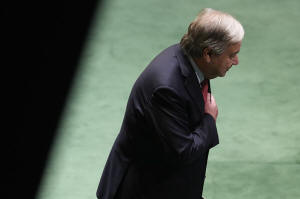Leaders depart UN facing prospect of a wider Mideast war — but with a
blueprint for a better future
 Send a link to a friend
Send a link to a friend
 [October 01, 2024]
By EDITH M. LEDERER and JENNIFER PELTZ [October 01, 2024]
By EDITH M. LEDERER and JENNIFER PELTZ
UNITED NATIONS (AP) — They gathered at the United Nations surrounded by
unsettling warnings of an escalating conflict that could engulf the
Middle East and further shatter international relations that are based
on "multilateralism" — nations working together and sharing power. A
week later, world leaders headed home with the prospect of a broader war
intensifying and global divisions front and center, not only in the
Mideast but elsewhere.
There was no expectation of major breakthroughs in the public and
private meetings at the annual U.N. General Assembly meeting of
presidents, premiers and other leaders. There rarely is. But this year
was especially grim, with no end in sight to the three major conflicts
in Gaza, Ukraine and Sudan, and Israeli military action in Lebanon
escalating.
U.N. Secretary-General Antonio Guterres’ warning that multilateralism
needs to be brought back “from the brink” added to the gloom, along with
speech after speech decrying failures to tackle climate change and
address growing inequalities between rich and poor nations, and warning
of artificial intelligence with no guardrails and the potential of
killer weapons with no human control.
General Assembly President Philémon Yang concluded the weeklong,
high-level meeting Monday afternoon, calling it “particularly
tumultuous” and pointing to the “violent conflicts” that are raging.
“This is, unfortunately, not an exhaustive list of the crises and
conflicts affecting member states of the United Nations,” he lamented.

Parts of the world are broken
There was no disagreement that multilateralism is broken, that this
founding principle of the United Nations – established in 1945 on the
ashes of World War II -- needs urgent resuscitation to deal with the
challenges the world faces today.
One example: During the very hour on Friday when Israeli Prime Minister
Benjamin Netanyahu told the General Assembly that his country genuinely
wants peace — a goal stressed by virtually every leader — Israeli
warplanes were bombing areas around Beirut in a lethal barrage.
In the last few days, Yang said, the world has seen “an extremely
dramatic escalation” between Israel and Hezbollah in Lebanon that risks
war in the entire Middle East. “As we speak, peace in the Middle East is
hanging delicately on a shoestring,” he warned..
U.N. spokesman Stephane Dujarric said this year’s meeting of leaders –
with its marquee speeches known in U.N.-speak as the “general debate” –
took place at “a very serious and a very intense time.”
"The world doesn’t stop for the general debate,” he told reporters
Monday. “So we were focused very much on what member states said, but we
continue to be very much focused on what is going on in the world
outside of this building.”
There was one positive development welcomed by Secretary-General Antonio
Guterres and many leaders: The adoption of a “Pact for the Future” at a
summit just before world leaders began their addresses to the General
Assembly. The 42-page blueprint aims to bring the 193 U.N. member
nations together to meet today’s challenges, from climate change and
artificial intelligence to escalating conflicts and increasing
inequality and poverty.

[to top of second column]
|

United Nations Secretary-General António Guterres puts his hand over
his heart after speaking to the 79th session of the United Nations
General Assembly at United Nations headquarters, Tuesday, Sept. 24,
2024. (AP Photo/Seth Wenig)

It challenges leaders of countries large and small, rich and poor,
to turn promises into actions. Whether that happens remains to be
seen. Yang, the assembly president, said his office has already
instituted “an awareness-raising campaign” to spur implementation.
Screeds against selfishness abounded
In an illustration of the blend of woe and weary hope that
percolated through the gathering, Burundi’s foreign minister, Albert
Shingiro, on Monday decried an international community where “most
of us act like we were alone in the world, like others didn’t exist
or didn’t count.”
Still, he said, the consensus on the Pact for the Future “shows that
multilateralism is not dead and buried.”
From the vantage points where leaders of smaller or less powerful
nations sit, the U.N. can’t change the world without changing
itself. Founded with 51 member countries, it now has 193, and many
feel included only to a point.
“We must ensure that global institutions give developing countries,
especially small, vulnerable ones like my own, seats at the tables
of decision-making,” said Barbados’ prime minister, Mia Mottley.
“The anger and mistrust of our citizens in institutions, in leaders
and in multilateralism and its processes which exclude, while
yielding much talk and little action, is very real."
Nobel peace laureate Muhammad Yunus, head of Bangladesh’s interim
government, said “time demands new attitudes, new values, new
compacts, across communities and countries.”
"I believe, the world needs to engage on a shared vision of ‘three
zeroes’ that we can materialize together, targeting zero poverty,
zero unemployment, and, zero net carbon emissions -- where a young
person anywhere in the world will have opportunities to grow, not as
a job seeker but as entrepreneur,” he told the assembly.

During the global gathering, the assembly heard from 190 countries –
all but Brunei, Myanmar and Afghanistan. The speakers included 71
heads of state, 42 heads of government, six vice-presidents and
crown princes, eight deputy prime ministers, 53 ministers, three
vice-ministers and seven heads of delegations. Usually, the U.N.
Security Council holds one meeting during the high-level week, but
this year the council met about a half-dozen times because of the
global conflicts and crises.
For all the alarm, leaders here are politicians, and many made a
point of appealing at least somewhat to optimism. Perhaps none
stressed it as much as U.S. President Joe Biden, making his last
speech at the annual meeting after more than a half-century in
public life.
He noted that humanity has brought to a close some of the seemingly
intractable threats, conflicts and injustices that beset the world
when he was elected as a senator in 1972, from the Cold War to
apartheid in South Africa.
“Things can get better,” Biden said. “We should never forget that.”
All contents © copyright 2024 Associated Press. All rights reserved |